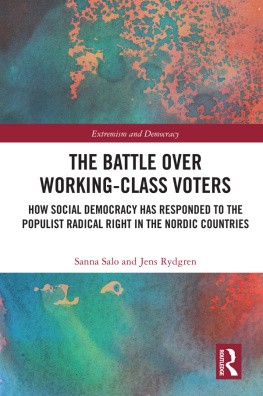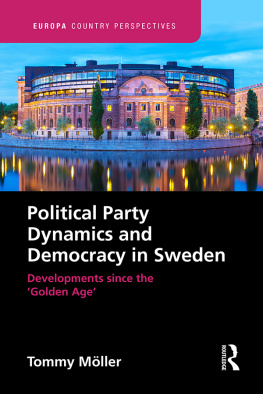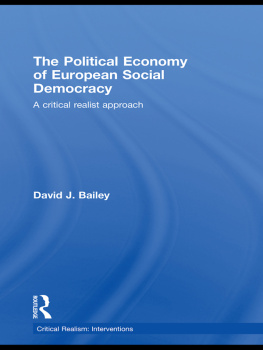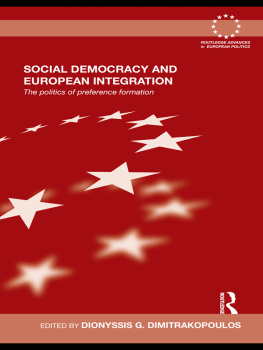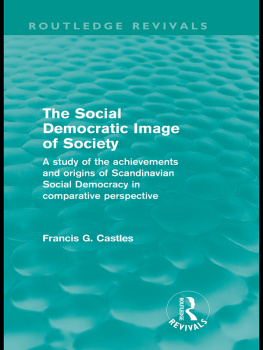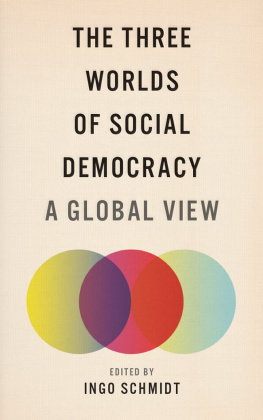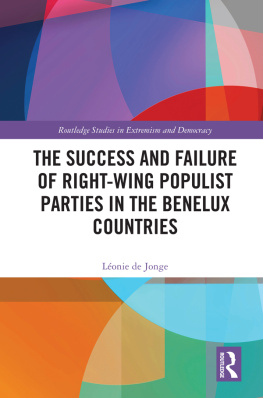The Battle Over Working-Class Voters
This book examines how social democratic parties have responded to populist radical right parties in the battle for support from working-class voters.
It focuses on the paradigmatic examples of social democratic parties in the Nordic countries. Historically these have been the strongest social democratic parties, but they have declined in recent years partly due to the competition from populist radical right parties. In addition, since populist radical right parties tend to support liberal and conservative parties in parliament or in governmental negotiations, social democratic parties ability to impact broader policy areas has declined as well. The book provides a detailed empirical account of how social democratic parties and more broadly, labour movement organisations, including unions have responded to these challenges across Denmark, Sweden, Finland, and Norway.
This volume will be of interest to scholars of party politics, comparative politics, Nordic politics, and the populist radical right.
Sanna Salo is a postdoctoral research fellow at the Centre for European Studies at the University of Helsinki, Finland.
Jens Rydgren is a professor of sociology in the Department of Sociology at Stockholm University, Sweden.
Routledge Studies in Extremism and Democracy
Series Editors: Caterina Froio,Sciences Po, Paris, France,Andrea L. P. Pirro, Scuola Normale Superiore, Florence, Italy, and Stijn van Kessel, Queen Mary University of London, UK
Founding Series Editors: Roger Eatwell, University of Bath, UK, and Cas Mudde, University of Antwerp-UFSIA, Belgium
This series covers academic studies within the broad fields of extremism and democracy, with volumes focusing on adjacent concepts such as populism, radicalism, and ideological/religious fundamentalism. These topics have been considered largely in isolation by scholars interested in the study of political parties, elections, social movements, activism, and radicalisation in democratic settings. A key focus of the series, therefore, is the (inter-)relation between extremism, radicalism, populism, fundamentalism, and democracy. Since its establishment in 1999, the series has encompassed both influential contributions to the discipline and informative accounts for public debate. Works will seek to problematise the role of extremism, broadly defined, within an ever-globalising world, and/or the way social and political actors can respond to these challenges without undermining democratic credentials.
The books encompass two strands:
Routledge Studies in Extremism and Democracy includes books with an introductory and broad focus which are aimed at students and teachers. These books will be available in hardback and paperback.
VOX
The Rise of the Spanish Populist Radical Right
Jos Rama, Lisa Zanotti, Stuart J. Turnbull-Dugarte and Andrs Santana
Routledge Research in Extremism and Democracy offers a forum for innovative new research intended for a more specialist readership. These books will be in hardback only.
The Success and Failure of Right-Wing Populist Parties in the Benelux Countries
Lonie de Jonge
For more information about this series, please visit: www.routledge.com/Extremism-and-Democracy/book-series/ED
The Battle Over Working-Class Voters
How Social Democracy Has Responded to the Populist Radical Right in the Nordic Countries
Sanna Salo and Jens Rydgren
First published 2021
by Routledge
2 Park Square, Milton Park, Abingdon, Oxon OX14 4RN
and by Routledge
605 Third Avenue, New York, NY 10158
Routledge is an imprint of the Taylor & Francis Group, an informa business
2021 Sanna Salo and Jens Rydgren
The right of Sanna Salo and Jens Rydgren to be identified as authors of this work has been asserted by them in accordance with sections 77 and 78 of the Copyright, Designs and Patents Act 1988.
All rights reserved. No part of this book may be reprinted or reproduced or utilised in any form or by any electronic, mechanical, or other means, now known or hereafter invented, including photocopying and recording, or in any information storage or retrieval system, without permission in writing from the publishers.
Trademark notice: Product or corporate names may be trademarks or registered trademarks, and are used only for identification and explanation without intent to infringe.
British Library Cataloguing-in-Publication Data
A catalogue record for this book is available from the British Library
Library of Congress Cataloging-in-Publication Data
Names: Salo, Sanna, author. | Rydgren, Jens, author.
Title: The battle over working-class voters : how social democracy has responded
to the populist radical right in the Nordic countries / Sanna Salo and Jens Rydgren.
Description: Abingdon, Oxon; New York, NY: Routledge, 2021. |
Series: Extremism and democracy | Includes bibliographical references.
Identifiers: LCCN 2020054819 (print) | LCCN 2020054820 (ebook) |
ISBN 9780367502447 (hardback) | ISBN 9781003049234 (ebook)
Subjects: LCSH: Working classPolitical activityScandinavia. |
SocialismScandinavia. | PopulismScandinavia. |
Right-wing extremistsScandinavia. | Political partiesScandinavia. |
ScandinaviaPolitics and government.
Classification: LCC HD8540.A6 S35 2021 (print) |
LCC HD8540.A6 (ebook) | DDC 324.2/1720948dc23
LC record available at https://lccn.loc.gov/2020054819
LC ebook record available at https://lccn.loc.gov/2020054820
ISBN: 978-0-367-50244-7 (hbk)
ISBN: 978-0-367-50249-2 (pbk)
ISBN: 978-1-003-04923-4 (ebk)
Typeset in Times New Roman
by Newgen Publishing UK
Contents
This is a book about class and politics. It is a topic that has been the subject of inquiry for more than a century, but is today as acute as ever. Social scientists interest in the crucial role of social class for various political outcomes goes back to Marx and Weber, and social class retained its position as one of the key concepts in sociology and political science throughout the post-war years, not the least as a prominent predictor for electoral behaviour (Alford ).
But why study class and politics today? Some scholars were ready to declare class politics as dead or at least dying already decades ago. Early literature on electoral dealignment, for instance, argued that class had, since the 1960s, become increasingly irrelevant for political behaviour, as traditional working-class groups shrunk in size and electoral volatility increased (e.g. Dalton et al. 1984). Some scholars then suggested that class-based voting had become replaced by issue-oriented voting, where single issues make voters move between parties from one election to the next (e.g. Katz & Mair ).
But class never disappeared. Although commentators such as Francis Fukuyama (), about a half of their electorate is found among production and service workers.
The rise of the populist radical right has been accompanied with a drastic decline in the average vote share of Social Democratic parties across Western democracies. For example, the Social Democrats have in the past two decades lost 8.1 percentage points in support in Sweden, 5.2 in Finland, 16.4 in France, and a full 20.4 percentage points in Germany. As was mentioned above, the apparent dealignment between voters and the centre-left parties led some scholars to conclude that class position no longer matters for voting choice. Yet it has become clear in the recent decade that inequalities between socio-economically, spatially, and ethnically divided groups in Western societies are still persistent (e.g. Piketty : 52) put it, there has been electoral class

